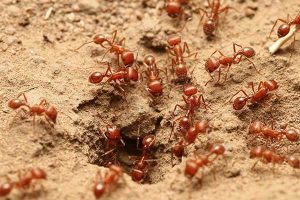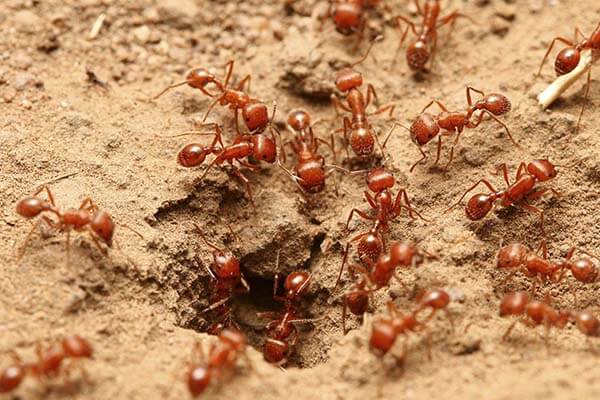Ants
Ant : Any member of approximately 10,000 species of the social insect family Formicidae. Ants are found worldwide but are especially common in hot climates. They range from 0.1 to 1 in. (2–25 mm) long and are usually yellow, brown, red, or black.
Ants eat both plant and animal substances; some even “farm” fungi for food, cultivating them in their nests, or “milk” aphids. Ant colonies consist of three castes (queens, males, and workers, including soldiers) interacting in a highly complex society paralleling that of the honeybees.
Well-known ant species are the carpenter ants of North America, the voracious army ants of tropical America, and the stinging fire ant.

There are generally three castes, or classes, within a colony: queens, males, and workers. Some species live in the nests of other species as parasites. In these species the parasite larvae are given food and nourishment by the host workers. Wheeleriella santschii is a parasite in the nests of Monomorium salomonis, the most common ant of northern Africa.
Weaver ants (Oecophylla smaragdina) binding leaves together with larval silk.
Most ants live in nests, which may be located in the ground or under a rock or built above ground and made of twigs, sand, or gravel. Carpenter ants (Camponotus) are large black ants common in North America that live in old logs and timbers. Some species live in trees or in the hollow stems of weeds.
Tailor, or weaver, ants, found in the tropics of Africa (e.g., Tetramorium), make nests of leaves and similar materials held together with silk secreted by the larvae. Dolichoderus, a genus of ants that are found worldwide, glues together bits of animal feces for its nest.
The widely distributed pharaoh ant (Monomarium pharaonis), a small yellowish insect, builds its nest either in houses, when found in cool climates, or outdoors, when it occurs in warm climates.
Army ants
Army ants, of the subfamily Dorylinae, are nomadic and notorious for the destruction of plant and animal life in their path.
The army ants of tropical America (Eciton), for example, travel in columns, eating insects and other invertebrates along the way. Periodically, the colony rests for several days while the queen lays her eggs. As the colony travels, the growing larvae are carried along by the workers. Habits of the African driver ant (Dorylus) are similar.
The red imported fire ant (Solenopsis invicta), introduced into Alabama from South America, had spread throughout the southern United States by the mid-1970s. It inflicts a painful sting and is considered a pest because of the large soil mounds associated with its nests.
In some areas the red imported fire ant has been displaced by the invasive tawny crazy ant (also called hairy crazy ant, Nylanderia fulva), a species known in South America that was first detected in the United States (in Texas) in 2002. The hairy crazy ant is extremely difficult to control and is considered to be a major pest and threat to native species and ecosystems.
The life cycle of the ant has four stages, including egg, larva, pupa, and adult, and spans a period of 8 to 10 weeks. The queen spends her life laying eggs. The workers are females and do the work of the colony, with larger individuals functioning as soldiers who defend the colony.
At certain times of the year, many species produce winged males and queens that fly into the air, where they mate. The male dies soon afterward, and the fertilized queen establishes a new nest.
The food of ants consists of both plant and animal substances. Certain species, including those of the genus Formica, often eat the eggs and larvae of other ants or those of their own species. Some species eat the liquid secretions of plants.
The honey ants (Camponotinae, Dolichoderinae) eat honeydew, a by-product of digestion secreted by certain aphids. The ant usually obtains the liquid by gently stroking the aphid’s abdomen with its antennae.
Some genera (Leptothorax) eat the honeydew that has fallen onto the surface of a leaf. The so-called Argentine ant (Iridomyrmex humilis) and the fire ant also eat honeydew. Harvester ants (Messor, Pogonomyrmex) store grass, seeds, or berries in the nest, whereas ants of the genus Trachymyrmex of South America eat only fungi, which they cultivate in their nests.
The Texas leafcutter ant (Atta texana) is a pest that often strips the leaves from plants to provide nourishment for its fungus gardens.
The social behaviour of the ants, along with that of the honeybees, is the most complex in the insect world. Slave-making ants, of which there are many species, have a variety of methods for “enslaving” the ants of other species. The queen of Bothriomyrmex decapitans of Africa, for example, allows herself to be dragged by Tapinoma ants into their nest.
She then bites off the head of the Tapinoma queen and begins laying her own eggs, which are cared for by the “enslaved” Tapinoma workers. Workers of the slave-making ant Protomognathus americanus raid nests of Temnothorax ants, stealing the latter’s pupae.
The pupae are raised by P. americanus to serve as slaves, and, because the Temnothorax pupae become imprinted on the chemical odour of the slave-making ants, the captive ants forage and routinely return to the slave-making ant nest.

